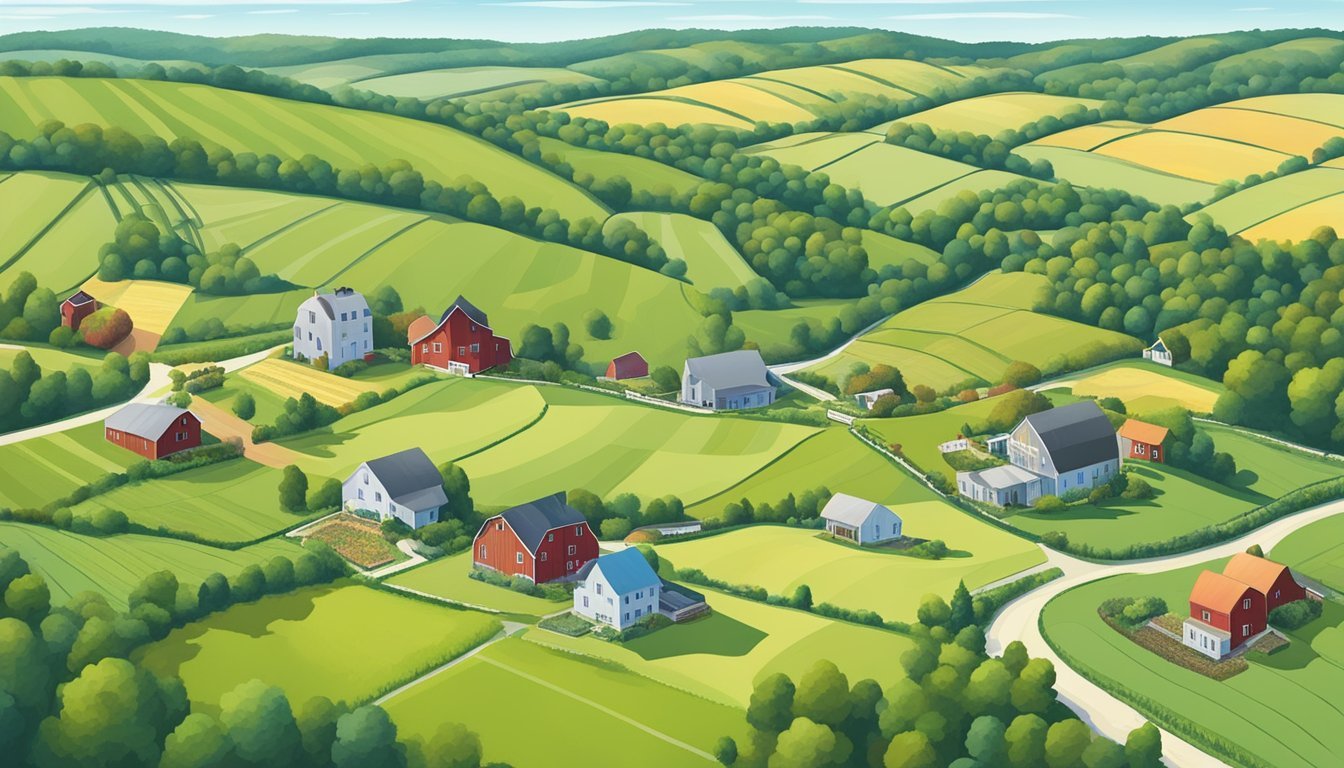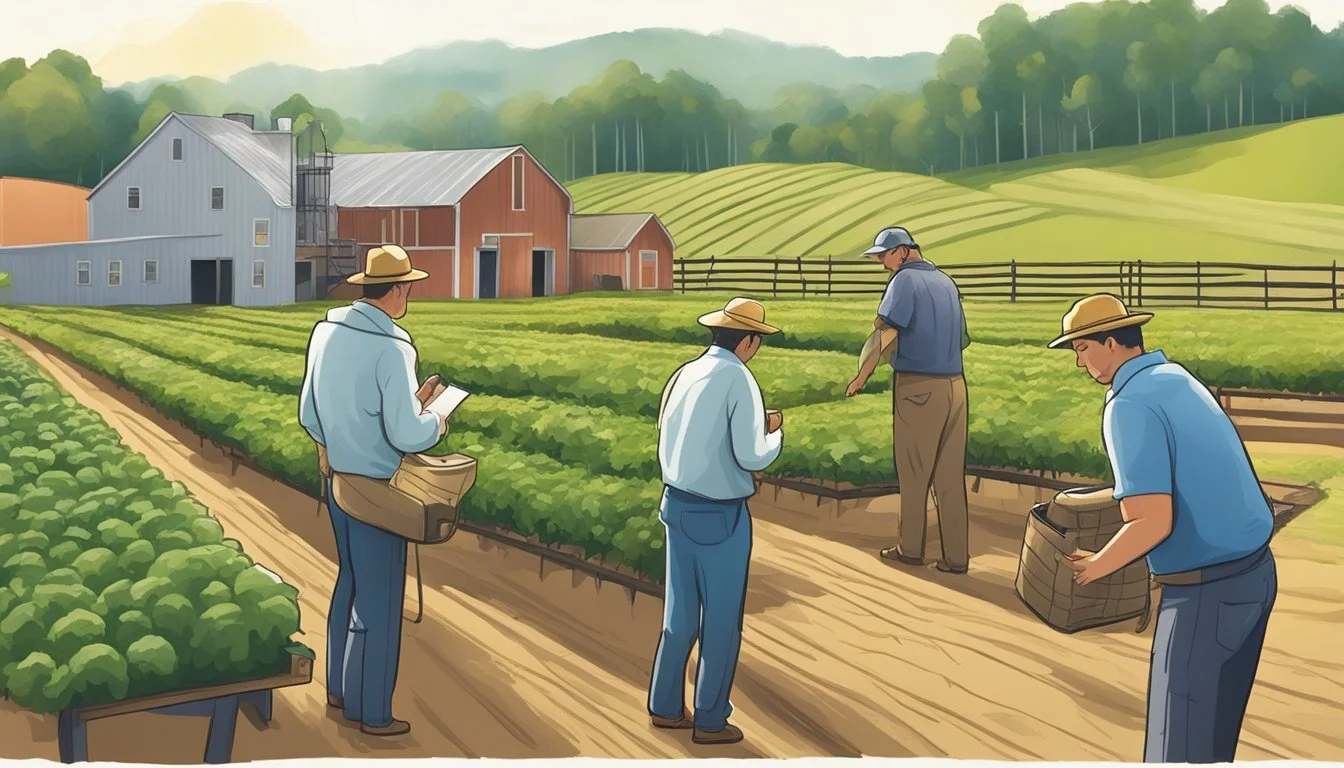Small Farms for Sale in New Jersey
Your Guide to Buying Local Countryside Properties
This Article is Part of State-by-State Guide to Buying Your First Small Farm
New Jersey, known for its rich agricultural heritage and diverse landscapes, offers a unique opportunity for individuals interested in embracing the rural lifestyle through the acquisition of small farms. These properties not only support a wide range of agricultural activities but also reflect the state's commitment to preserving farmland and fostering local food production. With a variety of small farms available for sale across the state, prospective buyers can find options in counties such as Cumberland, Monmouth, and beyond.
While exploring small farms for sale in New Jersey, potential buyers will come across farms that typically feature modest acreage, suitable for personal farming projects or small-scale commercial agriculture. The properties vary in size, features, and price, ensuring there is something to cater to different needs and budgets. Whether it’s a fully equipped farm with existing infrastructure or a blank canvas waiting for new development, New Jersey’s small farms present pragmatic options for those wishing to venture into farming or simply to enjoy the rural way of life.
The market for these farms is dynamic, with properties ranging from a few acres to larger plots that still retain the 'small farm' ethos. Aspiring farm owners can expect to find homes with comfortable living spaces, alongside functional barns and outbuildings, within pastoral settings that often provide easy access to local markets and communities. This market segment meets the growing demand for sustainable and locally grown produce, offering a tangible way to invest in and contribute to New Jersey's agricultural landscape.
Overview of Small Farms in New Jersey
New Jersey offers a diverse array of small farms for sale, catering to a variety of agricultural pursuits. Prospective buyers can find properties ranging widely in acreage, suiting both commercial farmers and those looking for a more rural lifestyle.
Availability and Acreage
Monmouth County: Known for its rich soil, Monmouth boasts farms from a 2-acre property in Farmingdale to larger 12-acre holdings in Allentown, suitable for diverse farming activities.
Gloucester County: This county features farms offering between 7 to 15 acres, ideal for both crop cultivation and livestock.
Cumberland and Atlantic Counties: Smaller acreages, such as a 34-acre site in Greenwich and 9.38 acres in Hammonton, indicate the variety available in South Jersey.
Property Types
Farms on the market often include residential features:
Houses with 3 bedrooms and square footage varying from 500 sq ft in Glassboro to expansive homes upwards of 3,000 sq ft.
Architectural types range from traditional farmhouses to newer constructions with modern amenities.
Farm Features
Land Use: The state's farms are varied, some already tailored for specific uses such as equestrian facilities, orchards, or crop farming. This flexibility allows buyers to tailor their purchase to their intended farming practice.
Infrastructure: Many farms contain essential outbuildings like barns, storage sheds, and greenhouses that are key for different types of agricultural functionalities.
The variety in property types and land sizes reflects the diverse agricultural landscape of New Jersey, highlighting the state as an attractive market for small farms.
Understanding the Real Estate Market
When considering small farms for sale in New Jersey, the real estate market can be characterized by a range of listing ages and varying purchase prices. Specific market indicators and recent trends provide a clearer picture for potential buyers.
Key Market Indicators
Listing Age: Properties on the market vary in how long they have been listed. In New Jersey, small farms can have listing ages that range from as recent as 40 days to those approaching the six-month mark.
Purchase Price: The purchase price of small farms in New Jersey can span a significant range. Listings may show prices as low as $7,000 for undeveloped land to upwards of $1,150,000 for established farms with sizeable acreage and residential amenities.
Recent Market Trends
Price Trend: The average price of farmland in New Jersey is approximately $1.4 million, reflecting the value of both residential features and land potential.
Size and Characteristics: Recent sales and listings indicate a trend toward farms with 10 to 20 acres of land, often accompanied by multi-bedroom houses, indicating a market leaning toward medium-scale farming operations that can support family living.
Finding the Right Property
When searching for small farms for sale in New Jersey, potential buyers should focus on key factors such as aligning property features with their specific needs, the amount of acreage that fits their goals, and the appropriate property size to support their intended farming activities.
Matching Properties to Your Needs
Prospective buyers must identify properties that align with their farming aspirations, whether they intend to raise livestock, cultivate crops, or engage in hobby farming. They should consider the infrastructure in place, such as barns and fencing, and assess the property's soil quality, water access, and any existing agricultural equipment.
Exploring Acreage Options
Acreage is a significant consideration as it dictates the scale of farming operations. Buyers should examine:
Total acreage: How much land is available for cultivation or grazing.
Usable land: The proportion of land suitable for farming purposes.
They should be aware of zoning laws which may affect the use of the land and the potential for expansion or diversification.
Considering Property Size
The size of the property is crucial for determining the type of farm operation. Buyers should look for a property that provides sufficient space for their needs, while also considering maintenance and management.
Small to medium sized properties might range from 5 to 50 acres and are ideal for small-scale farming or hobby farms.
Larger farms and expansive acreage, often over 100 acres, can accommodate more extensive farming operations.
In New Jersey, with an average price per acre around $51,000 - $62,000, investors should evaluate the financial aspects, ensuring the property size justifies the investment and aligns with their budget.
Financial Aspects of Purchasing
When looking at small farms for sale in New Jersey, it's crucial for prospective buyers to understand the financial commitments involved. This includes grasping the listing price, price per acre, and anticipating total costs associated with the purchase.
Understanding Listing Price
The listing price of any property is the amount the seller is asking for. In New Jersey, small farm listing prices can range considerably. For instance, a 7-acre property in Gloucester County is listed at $799,890, while another 6.88-acre property in Monmouth County might be on the market for $1,100,000, highlighting regional price variability.
Calculating Price Per Acre
To determine the value of a farm, analyzing the price per acre provides a standard for comparison. A concrete example is an 11.5-acre farm listed at $850,000, which results in an approximate $73,913 per acre. Another property offers 7 acres at $799,890; therefore, the price per acre is roughly $114,270.
Estimating Total Costs
Prospective buyers must anticipate expenses beyond the purchase price. This includes closing costs, fees for inspections, and any immediate farm improvements or equipment required. For example, if the purchase price is $799,890 and closing costs are approximately 2-5% of that price, then a buyer should budget an additional $15,998 to $39,994 for these immediate expenses.
Comparing Nearby Real Estate Options
When considering small farm purchases in New Jersey, buyers observe a diverse market with variable listing prices and property types. In Cumberland County, properties span around 10 to 12 acres, with listing prices ranging from $579,000 for a 3-bedroom residence to around $725,000. The homes typically include sizable square footage, exemplified by a 2,500 sq ft Bridgeton property listed at $579,000.
Monmouth County offers more spacious and pricier estates. For example, a 12-acre farm with a 3,082 sq ft home in Allentown has a listing price of approximately $1,150,000. Contrastingly, Wall Township showcases a luxurious 23.4-acre property with a grand 16,838 sq ft home, marked at around $7,999,000.
LandWatch notes properties in various regions, with the Central Region boasting 29 listings and the North Region with 9. Hunterdon and Gloucester Counties present multiple options, as well, emphasizing the geographical variety of available farms and ranches.
County Average Acreage Starting Price Property Type Cumberland ~11 acres $579,000 Residential farms Monmouth >12 acres $1,150,000 Larger farm estates Atlantic 8.4 acres $3,800,000 Mixed-use land
Prospective buyers will find that real estate options are influenced by location, with a direct correlation between the size of the farm and its proximity to urban centers. However, all regions maintain a focus on the charm of rural living, with properties offering both residential and agricultural potential.
Legal and Regulatory Considerations
When purchasing small farms in New Jersey, it is important for the buyer to understand the zoning and land use regulations, as well as the property tax implications. These factors can significantly impact the use, value, and operational potential of the farm.
Zoning and Land Use Regulations
New Jersey's Right to Farm Act protects qualifying farms from certain municipal regulations and public nuisance lawsuits. To be protected:
The farm must engage in agriculture or horticulture production.
For operations larger than five acres, there must be an annual gross sales of at least $2,500.
Local zoning and land use regulations dictate what activities are permitted on the farm. Prospective buyers should:
Verify the zoning designation of the property.
Review local ordinances to confirm allowable agricultural practices.
Property Tax Implications
Farms in New Jersey may be eligible for tax benefits under the Farmland Assessment Act. Benefits include a reduced property tax rate for lands used for agricultural production. To qualify, the farm:
Must be actively devoted to an agricultural or horticultural use for at least two years.
Must have a minimum of five acres in use.
The agricultural use must result in a minimum annual gross income of:
$1,000 for the first five acres.
$5 for each additional acre.
For farms smaller than five acres, there must be evidence of anticipated gross income of at least $500 per year.
To maintain these benefits, farm owners must annually apply to their local tax assessor.
Preparing to Buy
When venturing into the purchase of a small farm in New Jersey, a prospective buyer should focus on understanding the components of making an effective offer and employing strategic negotiation techniques.
Making an Offer
A buyer should commence by presenting a formal written offer to purchase the desired small farm. This offer should include:
The offered price
Terms and conditions of the sale
Any contingencies such as inspections or financing
Proposed closing date
Documentation, such as a recent property appraisal, can help justify the offered amount.
Negotiation Strategies
Effective negotiation is contingent on two main strategies: research and flexibility. Buyers should:
Research comparable sales in New Jersey to determine a fair offer.
Understanding the current market to gauge whether the market favors buyers or sellers is crucial.
Being open to concessions on lesser points can strengthen one's position on more significant aspects of the deal.
Closing the Deal
Closing the deal on a small farm in New Jersey requires attention to detail and an understanding of the transactional steps involved. This section will guide prospective buyers through the closing process to ensure a secure and legal transfer of property.
Understanding the Closing Process
The closing process is the final stage in purchasing a farm, involving the transfer of funds and the property title from the seller to the buyer. It generally includes the following key steps:
Final Walkthrough: A chance for the buyer to verify that the property's condition has not changed significantly since the initial agreement.
Review of Documents: Essential documents should be reviewed for accuracy and clarity. These documents typically include:
Deed
Bill of Sale
Transfer Tax Declarations
Mortgage Documents (if applicable)
Closing Costs: The buyer and seller settle any outstanding costs, often including:
Title Insurance
Property Taxes
Attorney Fees
Finalizing the Purchase
To finalize the purchase of a small farm in New Jersey, buyers must:
Sign legal documents: This includes the mortgage and promissory note if the purchase involves a loan.
Pay closing costs and down payment: Payments should be made according to the agreed terms, frequently by wire transfer or certified funds.
Record the deed and mortgage: It is crucial to file these documents with the local county office to formalize the ownership change.
The completion of these proceedings ensures that the buyer legally acquires the farm and can take possession of their new property.






